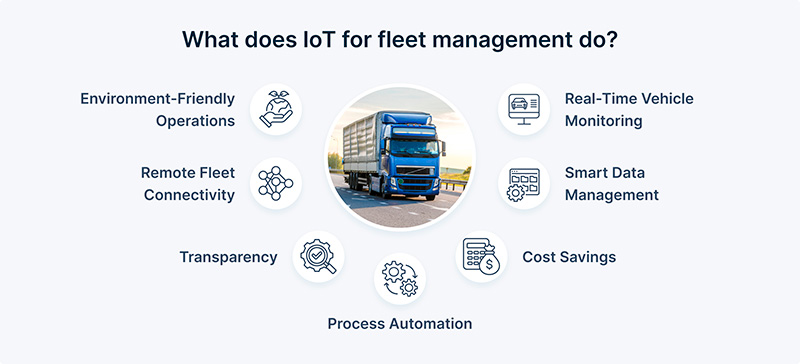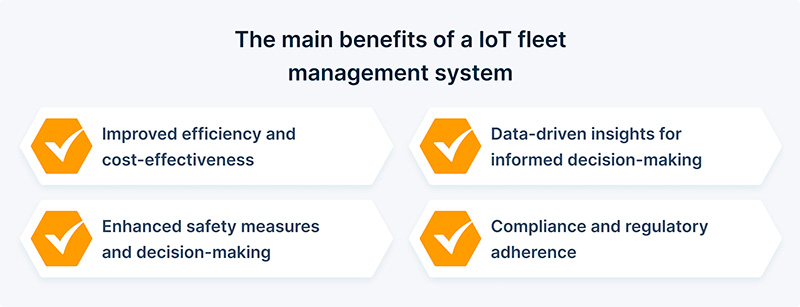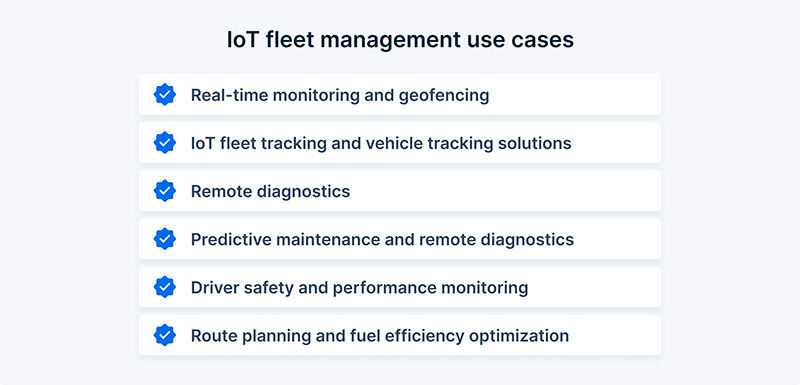IoT for Fleet Management: A Detailed Guide
December 15, 2023Did you know that by 2025, it's estimated that over 75 billion devices worldwide will be connected to the Internet of Things? Among the myriad industries transformed by this technological revolution, one of the most profoundly affected is fleet management.
The fusion of IoT fleet management has ushered in an era of unprecedented efficiency, precision, and optimization in overseeing vehicle operations. From real-time vehicle tracking to predictive maintenance, IoT solutions for fleet management are revolutionizing how businesses manage their fleets.
In this article, we'll delve into the multifaceted world of IoT fleet management, exploring its defining features, main benefits, cutting-edge solutions, and how it's reshaping the landscape of transportation and logistics. Join us as we explore the intersection of IoT connectivity and fleet management innovation.
In recent years, the amalgamation of technology and logistics has significantly transformed the landscape of fleet management. At the heart of this evolution lies the concept of IoT, or the Internet of Things, which has revolutionized the way companies oversee and optimize their fleet operations.
What is IoT fleet management?
IoT for fleet management represents a paradigm shift in how vehicles, devices, and systems interconnect and communicate, fostering a network that enables seamless data exchange and real-time insights. Essentially, it integrates sensors, software, and connectivity to facilitate the exchange of information between vehicles, infrastructure, and fleet managers. This connectivity empowers decision-makers with a comprehensive view of their fleet's performance, enabling them to make informed and strategic decisions swiftly.

IoT solutions offer a holistic approach to fleet management by providing a robust framework for monitoring, tracking, and managing assets efficiently. Leveraging IoT devices embedded in vehicles, GPS systems, and other equipment, fleet managers gain unparalleled visibility into various operational aspects in real-time.
IoT for fleet management solutions and their impact
IoT fleet management solutions encompass a wide array of technologies designed to streamline fleet operations. They include predictive maintenance systems that anticipate potential issues before they occur, geofencing capabilities for enhanced security and route optimization, and data analytics tools providing valuable insights into driver behavior, fuel consumption, and overall vehicle performance. Implementing IoT fleet management solutions empowers companies to proactively address challenges, reduce downtime, and optimize resources effectively.
Benefits of implementing IoT for fleet management

The benefits of a fleet management system are numerous, and one of the most significant is improved efficiency and cost-effectiveness. This is achieved through various means, such as:
- Optimized routes. By leveraging data on traffic patterns and real-time conditions, IoT-powered solutions can recommend the most efficient routes for drivers, minimizing travel time and fuel consumption.
- Predictive maintenance. By continuously monitoring vehicle performance, IoT sensors can identify potential issues before they become serious problems. This allows for preventive maintenance, reducing downtime, and extending the life of vehicles.
- Improved driver behavior. Real-time monitoring of driver behavior can help identify areas for improvement, such as speeding or harsh braking. This information can be used to provide targeted training and coaching, leading to safer and more efficient driving.
- Reduced paperwork. By automating tasks such as logging fuel usage and mileage, IoT solutions can streamline operations and free up administrative time.
Another key benefit of a fleet management system is enhanced safety and security. This is achieved through features such as:
- Real-time tracking. Fleet managers can track the location of all vehicles in real-time, allowing for quick response to emergencies.
- Geofencing. This feature allows fleet managers to create virtual boundaries around specific areas. If a vehicle enters or leaves a geofence without authorization, an alert is sent, helping to prevent theft and unauthorized use.
- Driver monitoring. IoT sensors can be used to monitor driver behavior, such as speed, braking, and seatbelt use. This information can be used to identify risky behavior and provide feedback to drivers.
In addition, a fleet management system can provide valuable data-driven insights that can help improve decision-making. This data can be used to:
- Identify trends and patterns. By analyzing data over time, fleet managers can identify trends and patterns that can help them make better decisions about resource allocation, route planning, and vehicle maintenance.
- Benchmark performance. Fleet managers can compare their performance against industry benchmarks to identify areas for improvement.
- Make informed decisions.
By having access to accurate and up-to-date data, fleet managers can make more informed decisions about their operations.
The last but not least benefit of IoT for fleet management we’ll discuss is enhanced compliance and regulatory adherence. With ever-evolving regulatory landscapes, compliance is a critical aspect of fleet management.
IoT solutions assist in maintaining compliance by providing accurate data records, ensuring adherence to transportation regulations, and facilitating efficient reporting. This reduces the risk of penalties, enhances overall compliance posture, and mitigates potential legal issues.
These are just a few of the many benefits of implementing IoT-based solutions for fleet management. By leveraging these technologies, businesses can improve operational efficiency, enhance safety and security, gain valuable insights, and make data-driven decisions that optimize their fleet operations.
IoT fleet management use cases and applications
The ever-evolving landscape of technology presents exciting opportunities for various industries, and fleet management is no exception. The integration of the Internet of Things into fleet operations has revolutionized the way businesses monitor, manage, and optimize their mobile assets.
Let’s delve into the practical applications of IoT within fleet management and highlight how these innovative solutions translate into tangible benefits for businesses.

Real-time monitoring and geofencing
IoT-enabled real-time monitoring is one of the standout applications in fleet management. By leveraging GPS technology and IoT sensors, fleet managers gain the capability to track vehicles' precise locations, monitor routes, and analyze driver behavior in real-time. Geofencing, a feature enabled by IoT, allows for the creation of virtual geographic boundaries. Fleet managers receive alerts when vehicles enter or exit predefined zones, enhancing security measures and ensuring adherence to designated routes. Everything is made possible by the IoT vehicle tracking system.
IoT fleet tracking and vehicle tracking solutions
IoT-enabled fleet tracking solutions provide real-time visibility into the entire fleet. These solutions utilize GPS-enabled devices and sensors to track vehicle locations, monitor routes, and gather data on driver behavior. The integration of IoT in fleet tracking systems enables precise monitoring of assets, enhances security measures, and ensures compliance with scheduled routes. Furthermore, IoT vehicle tracking solutions deliver comprehensive insights into fuel consumption patterns, driving behavior, and maintenance needs. This information proves instrumental in optimizing operational efficiencies and reducing unnecessary costs.
Remote diagnostics
The application of IoT in predictive maintenance is transforming how fleet maintenance is approached. Through continuous data collection and analysis, IoT-powered systems predict potential faults or maintenance needs in vehicles before they escalate into critical issues. Fleet managers receive proactive alerts, enabling scheduled maintenance and minimizing unplanned downtime. Remote diagnostics allow for the remote assessment of vehicle health, facilitating timely interventions and reducing operational disruptions.
Predictive maintenance and remote diagnostics
Another transformative application of IoT in fleet management is predictive maintenance. IoT-enabled systems continuously gather data on vehicle health, detecting anomalies and potential issues in real-time. Through predictive analytics, fleet managers can anticipate maintenance requirements before critical failures occur, enabling proactive interventions. Remote diagnostics, facilitated by IoT, allow for remote monitoring of vehicle conditions, enabling timely maintenance and reducing unplanned downtime.
Driver safety and performance monitoring
IoT-based solutions contribute significantly to driver safety and performance monitoring. By integrating IoT sensors and devices within vehicles, fleet managers can monitor driver behavior in real-time. These systems track metrics such as speed, braking patterns, and adherence to safety protocols. Alerts are triggered for reckless driving behaviors, allowing for immediate corrective action and promoting safer driving practices among drivers. This not only enhances safety but also optimizes fuel efficiency and extends the vehicle’s lifespan.
Route planning and fuel efficiency optimization
IoT-driven analytics and telematics aid in optimizing routes and fuel consumption. Fleet managers utilize historical data and real-time insights to identify the most efficient routes, considering factors like traffic patterns, weather conditions, and fuel efficiency. This leads to reduced fuel consumption, a minimized carbon footprint, and cost savings for fleet operations.
The future of IoT in fleet management
The evolution of IoT in fleet management continues to shape a future where connectivity, data-driven insights, and innovation converge to redefine the efficiency and efficacy of managing fleets. Looking ahead, several trends and advancements indicate a promising trajectory for IoT's role in revolutionizing fleet operations.
Advancements in predictive analytics and artificial intelligence
The future of IoT in fleet management heralds a new era of predictive analytics and AI-driven insights. As technology progresses, IoT systems will evolve to predict maintenance needs with even greater accuracy, leveraging machine learning algorithms to analyze vast amounts of data. These advancements will enable fleet managers to foresee potential issues more precisely, allowing for proactive maintenance measures and minimizing downtime.
Enhanced connectivity and 5G integration
The advent of 5G technology is set to revolutionize IoT connectivity in fleet management. The high-speed, low-latency capabilities of 5G networks will enable seamless communication between vehicles, infrastructure, and fleet management systems. This enhanced connectivity will facilitate real-time data transfer, enabling quicker decision-making, more precise tracking, and improved overall operational efficiency.
Continued evolution of autonomous vehicles and IoT
The synergy between IoT and autonomous vehicles represents a significant frontier in fleet management. IoT sensors, coupled with AI algorithms, enable autonomous vehicles to communicate with each other and with centralized fleet management systems. This connectivity allows for synchronized traffic flow, enhanced safety features, and optimized routing, paving the way for more widespread adoption of autonomous fleets in the future.
Focus on sustainable and green initiatives
The future of IoT in fleet management is intrinsically linked to sustainability. IoT-driven analytics will increasingly prioritize eco-friendly practices, optimizing routes and vehicle operations to minimize environmental impact. This focus on sustainability aligns with the global push towards greener initiatives and contributes to reducing carbon footprints across fleets.
Conclusion
IoT solutions for fleet management have redefined conventional paradigms, offering a comprehensive suite of tools that empower fleet managers with unparalleled visibility and control. IoT for fleet management streamlines operations, from real-time monitoring through IoT fleet tracking to predictive maintenance facilitated by IoT telematics.
The benefits derived from implementing IoT in fleet management are multifaceted. Enhanced efficiency, cost-effectiveness, and data-driven decision-making capabilities stand out as pivotal drivers in steering businesses towards operational excellence. Additionally, the fusion of AI-driven analytics and the integration of blockchain technology reinforce data security and accuracy, laying the groundwork for a more robust and reliable fleet management ecosystem.
In essence, the adoption of IoT in fleet management transcends technological adoption; it represents a strategic imperative for businesses aiming to thrive in an increasingly competitive landscape. The comprehensive suite of benefits, from efficiency gains to enhanced safety measures, underscores the pivotal role that IoT plays in shaping the success and sustainability of modern fleet operations. Embracing IoT solutions becomes not merely an option but a strategic necessity to steer fleet management towards a future imbued with agility, intelligence, and resilience.





